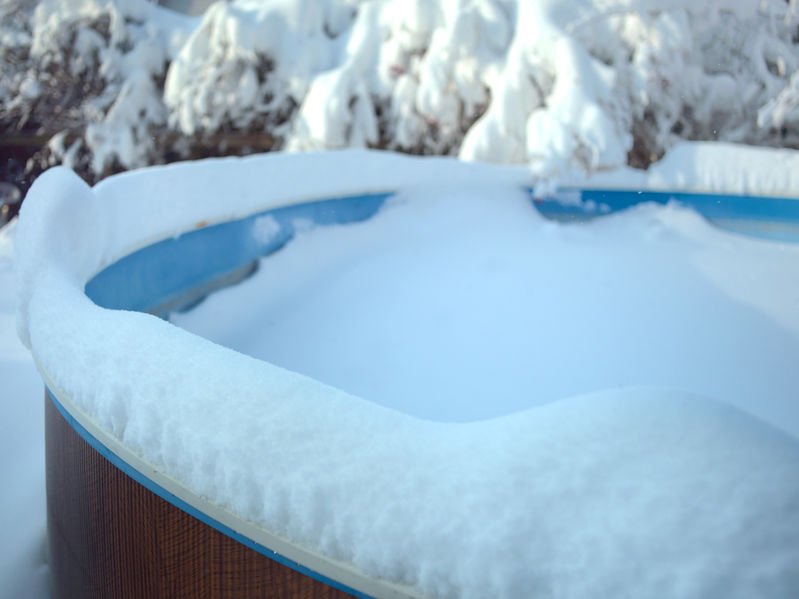What If My Pool Freezes Completely?

What If My Pool Freezes Completely?
- December 13, 2022
- Pools
Winter comes with its share of problems; for pool owners, a frozen pool could be at the top of their list. Yes, pools can freeze solid within a few days of temperatures dropping below zero, especially when the water’s not circulating.
And if low temperatures continue for several days, the ice sheet can increase in thickness by up to ¼ of an inch per day. It is, therefore, important to prep your pool well in advance to avoid major pool issues.
Freezing of Vinyl Liner Pools
If your pool has a vinyl liner, ice sheets can cause damage if your pool springs a leak. Several inches of water leaking beneath an ice sheet can cause the sheet to fall, damaging the pool liner. Do NOT pump out the water beneath an ice sheet; instead, add water if needed.
Rising Sun Pools & Spas has been providing pool services in Raleigh, NC, for over five decades. In this article, we share valuable insights into what you should do if your pool freezes in the winter, preventive steps you can take, and when to close your pool down for the season.
What To Do if Your Pool Freezes
A thin sheet of ice across the pool surface is not a cause for concern. Pools in mild climates – like in Raleigh, NC – often freeze across the surface overnight. However, if the ice sheet gets thicker than ¼ to ½ inches, the ice will start to expand, putting pressure on your pool tiles and skimmers – and can damage the tiles, pipes, and pool system.
Break Up The Ice
If your pool surface is covered in ice, you can (and should) carefully break up the ice to keep your pool tile borders from cracking. You can use the skimmer’s pole to do this. However, if the ice sheet is thicker than ¼ to ½ inches, you need to wait for the ice to thaw before breaking it.
Reduce Water Level
Most pool tiles are frost-free, but as a precaution, maintain a water level under the skimmer or perimeter pool tile band. Ice can crack tile or loosen the grout, letting small pieces of tile come loose. Thus, keeping your water well below the tile can minimize the damage.
Keep Filter Pumps Running
Overall, the best way to keep thick ice sheets from forming and to prevent pool water from freezing within the plumbing is to keep the filter pump running. When temperatures dip below freezing, your pool’s pipes and valves need to consistently have water flowing through them. Keep your filter running for 8-10 hours a day during the off-season (or non-stop when temperatures reach below freezing).
Moving water does not typically freeze unless the temperatures remain below zero for more than a few days. However, to be safe, ensure all pipes and valves have water moving through them when temperatures are due to drop.
Cleaning and Maintenance
Be sure to stay on top of pumping and cleaning your pool during the winter. If you don’t, your pool cover can fill up with heavy ice sheets and develop holes from their sharp edges. It’s also important to keep your pool covers clean and keep the surface water under one inch.
Mesh safety covers may appear close to breaking under a heavy load of snow or ice, but don’t worry too much. Pool covers often freeze to the surface of the water and spring back to the original fit after thawing.
Inspect Pool Pipes
Pool pipes located above ground level can crack if pumps are not kept running when temperatures reach below 32°. If water freezes inside PVC pipes, the ice will expand, cracking the pipes, pumps, valves, filters, and heaters. Consider wrapping your PVC plumbing with a heating cable for pipes if you cannot run the equipment for any reason.
Invest in a Quality Winter Cover
The right winter cover can do wonders for your swimming pool during the chilly season. You can even find winter covers that double as safety covers – ideally designed to prevent pets and young children from accidentally falling in the water.
LEARN MORE: Winter Covers VS. Safety Covers
Keeping Your Pool Open or Closed for the Season
There are many good reasons to keep your pool open during winter. For example, leaving it closed and untouched throughout the season might cause algae to grow. Other reasons you may consider keeping your pool open in winter include:
- • The convenience of scheduling routine cleaning services earlier rather than waiting for spring.
- • No need to spend on pool covers or pool winterizing materials.
- • And, if your pool is heated, you can even enjoy it during the holidays!
However, for many pool owners, it makes more sense to close the pool down for the season rather than keeping it open.
Firstly, damage to pool equipment is a significant risk of keeping your pool open all winter — pool plumbing and filtration systems might be damaged in case of an outage. This would mean spending more on repair and maintenance when temperatures rise back up.
In addition, keeping the pool heated through the season will inevitably lead to an increase in utility bills.
Here are some precautions to keep your pool from freezing:
- • Keep your pool heated at a specific temperature throughout winter.
- • Run the water heater for 12 hours a day to prevent freezing.
- • Keep the filter pump on 24/7 to maintain water circulation (especially when temperatures fall below 32°).
- • Install an automatic timer to automate water circulation.
- • Adjust pool jets upwards, so the water’s surface doesn’t freeze.
During an outage, remember to drain the plugs and cover the pool equipment before the water freezes and does more damage.
If you would rather not deal with a frozen pool or if you’re on the fence about closing it down temporarily, consider the following factors:
- • Your region’s climate often determines whether your pool can logically stay open all winter. Pools often can’t handle varying temperatures throughout the off-season.
- • If you have trees around the pool perimeter, they will keep shedding, and the leaves will likely land in your pool, which means additional pool cleaning.
- • Freezing temperatures can damage your pool pump, components, and plumbing system, leading to costly repairs.
If you decide to leave your pool open and unused during winter, set aside time for periodic checks to prevent freezing. Keep the water at least four inches below the skimmer to avoid pipe damage.
Rising Sun Pools & Spas — Your Trusted Pool Builders in Raleigh, NC
We’ve been the pool builders of choice for home and business owners in Raleigh, North Carolina for over 50 years. We bring our experience and expertise to every pool project we take on. There’s no pool construction, design, or renovation project we haven’t tackled yet.
If you plan to winterize your pool or have some pool concerns that need checking this winter, you can count on the Rising Sun Pools & Spas team to handle it for you. Contact us today!
READ MORE:
Recent Posts
- Managing Pool Chemistry During Heatwaves: A Summer Survival Guide
- Transform Your Backyard with Rising Sun’s Aboveground Pool Options
- Six Reasons to Choose a Resin Aboveground Pool
- Pollen-Proof Your Pool: Prevention Strategies That Actually Work
- Creating the Perfect Relaxation Space
- When Is It Time to Replace Your Pool Equipment?
- Spring Pool Opening: What to Expect and How to Prepare
- How to Prepare Your Hot Tub for Spring Use
- Top Pool and Spa Trends for 2025: What’s In and What’s Out
- Why Spring is the Best Time for Pool Renovations
